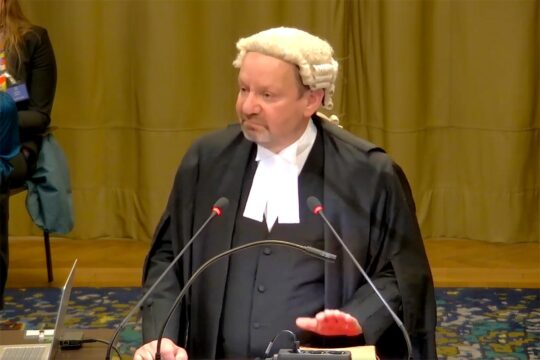The first people charged with supporting Palestine Action after the UK government banned it as a "terror" group appeared in court in London on Tuesday.
Hundreds of people have been arrested at protests accused of showing support for the pro-Palestinian organisation since it was proscribed by the UK government in July.
The trio who appeared on Tuesday, two of whom are in their 70s, were greeted outside Westminster Magistrates' Court by several dozen supporters, some chanting slogans and waving Palestinian flags.
Inside, more supporters packed the public gallery.
Jeremy Shippam, 72, Judit Murray, 71, and Fiona Maclean, 53, all entered not guilty pleas and were released on bail until a trial set for March 16 next year.
They were arrested after a protest in Westminster on July 5, when London's Metropolitan Police detained 41 people for allegedly supporting the group.
They are accused of displaying an article in a public place and arousing reasonable suspicion that they are a supporter of a proscribed organisation, according to the charge sheet.
The charges come under section 13 of the Terrorism Act of 2000.
They allegedly held placards reading "I oppose genocide, I support Palestine Action" prior to their arrest.
The government proscribed Palestine Action following several acts of vandalism, including against two planes at a Royal Air Force base which caused an estimated £7 million ($10 million) in damage.
At the time, Palestine Action said: "Despite publicly condemning the Israeli Government, Britain continues to send military cargo, fly spy planes over Gaza and refuel US/Israeli fighter jets."
"Britain isn't just complicit, it's an active participant in the Gaza genocide and war crimes across the Middle East," it said.
- Protesting a 'bad law' -
Critics of the ban, including the United Nations, have condemned it as legal overreach and a threat to free speech.
Kay Wagland, a fellow protester and friend of one of those charged, told AFP the government had banned a "non-violent direct action group as terrorist".
"That means no one can take any physical action. The protests are about this being a bad law," the 66-year-old retired environmental projects manager said.
Since the ban came into force, there have been multiple protests and arrests.
Police said earlier this month they had arrested 890 people in one London protest on September 6, the majority under anti-terror laws.
Clive Dolphin of campaign group Defend Our Juries, which organised the protests, said each of the hundreds of cases now going through the system would take up valuable court time.
"They took a piece of cardboard, they took a sharpie and they wrote some words on it, and according to the current UK law, that makes you a terrorist," he said after the hearing.
Protesters found guilty of section 13 offences face jail terms of up to six months and/or a fine.
Others charged under different sections of the anti-terror legislation could face jail terms of up to 14 years and/or a fine.


